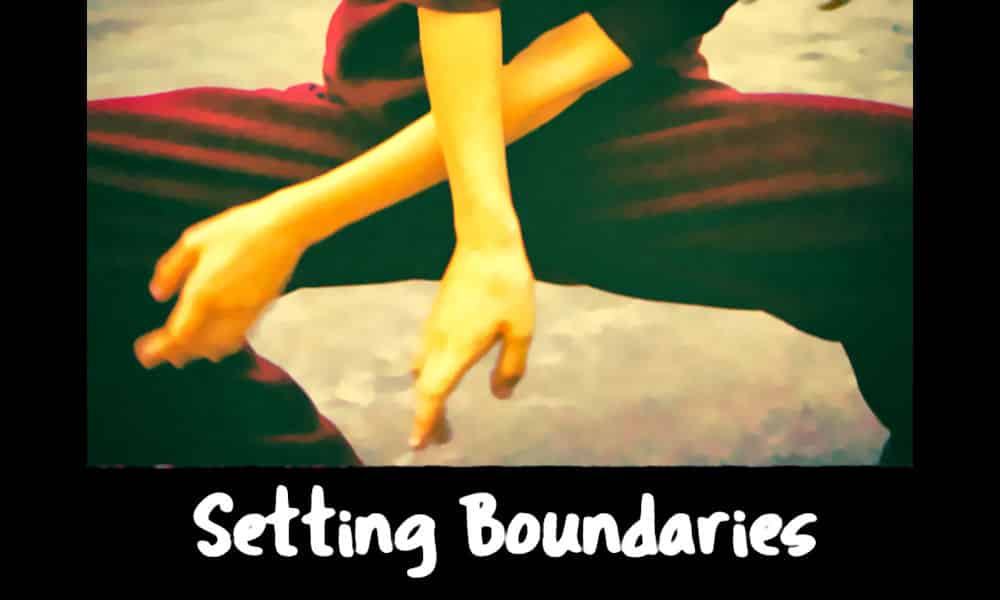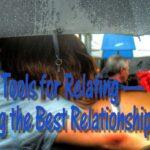Setting Boundaries — one source for stress is a lack of boundaries, AKA the inability to say no.

Psst!! Hey!!!
** Want more great writing designed to help YOU to shift your behaviour?
** Want to learn how to find, build or deepen your principal relationship?
** Want to know more about Zen living and being?
Check out Wayne’s books! (amazon link)
Or, check them out right on our site.
What Are Boundaries?
Personal boundaries are emotional, physical, and mental limits that we establish. Boundaries differ from person to person, and are:
- based on one’s needs and desires
- designed to protect him/herself from being used, manipulated, or even violated by others.
Setting boundaries is a personal responsibility, rooted in self-care and a desire to cultivate well-being.
The premise is that no one and nothing can hurt you if you don’t allow it.
Please note that last clause: “…if you don’t allow it.” The only exception to this rule is physical assualt, which you may or may not be able to “stop,” depending upon your physical abilities. All other forms of “broken boundaries” happen because they are “allowed” to happen.
Boundaries are commonplace.
Countries have borders, homes have fences and doors, and offices are either separate rooms or cubicles which serve to maintain security and a sense of privacy.
Personal boundaries can serve us in the same ways.
Boundaries are crucial to healthy relationships, a healthy self, and a healthy life.

Setting and sustaining boundaries is a skill that many people have not learned or mastered, but is essential for general well-being.
Boundaries are wide and varied:
- Saying no to a friend who requests a favor that will infringe on your own well-being
- Establishing clear limits as to what you will or will not do in order to protect your health and sanity
- Setting rules and ensuring your kids follow them while living at home
- Setting limits within a romantic relationship as to what behaviours you will allow
- Boundaries can also involve a personal decision as to how much you will tolerate in any given situation–for example: needing to take a time out during an argument
- Setting emotional expression limits to protect your emotional health
- Not doing things you don’t want to do or like to do just because someone else wants to
- Setting time for work, and making sure that work does not interfere with family and leisure time
- And, of course, setting limits in order to reduce stress, overwhelm and burnout
In essence, personal boundaries provide you with security and safety; they are your armour in ensuring self-care
It Is Not Selfish To Take Care Of Yourself

This is something we must realize when we want to learn to set boundaries and understand our limits. For many this is an obstacle.
Why are your needs any less important than those of others?
The belief that self-care is selfish is a false one. No one else can take care of you but you. No one else but you can understand and identify what impacts your well-being, sanity and stress levels but you.
When we put the needs of others before our own… we compromise our well-being, and this places an undue burden on ourselves and our relationships.
When we learn to say no, (or to set limits on what we will tolerate so as to not compromise our own personal values, needs and desires) we develop self-care, and this is the linchpin for reducing stress and living the lives we were meant to live.
How Boundaries Help You Manage Stress
The skill of setting boundaries is one of the most effective stress management tools. There are several reasons for this:
- First, without boundaries you are likely to be running around doing everything for others, without taking care of your own needs. This is profoundly and fundamentally stressful. The lack of understanding your own needs, desires and limits makes it difficult to take care of yourself, and without self-care, stress is bound be rampant in your life.
- Second, without boundaries it may seem that others are taking advantage of you, which can cause immense mental and emotional stress.
- Third, the lack of a comfort zone (which is provided by setting limits) can make it seem that you are always living on the edge, without a safety net. This leads to stress and its consequent responses in the body.
Key Considerations In Setting Boundaries
- Set and understand your limits — in order to have healthy boundaries, you must know where you stand. This means that you must identity your limits: emotional, physical, mental, and spiritual. Boundaries mean limits, and this means that you must be aware of what you can tolerate without stress or discomfort.
- Self-care is at the core of boundaries — boundaries are individual and personal choices that stem from and support the need to take good care of ourselves.
- What makes you uncomfortable may not be uncomfortable for others. This can become an obstacle, as others may exert pressure to “persuade you” to change a boundary.
- Self-awareness — setting boundaries requires a deep level of self-awareness and honoring of our own feelings. For example, a friend calls and says she needs you to babysit, but you are exhausted and have had a long week, and were planning to just relax. At this point it is crucial for you to identify your fatigue — and your own needs — and not say “yes” — even though this will put your friend in a bind.
- Deal With Personal Challenges — self-doubt, guilt, and fear are all potential pitfalls when it comes to our health, well-being, and how we set limits.
- We may be fearful of how the other person will respond, or imagine they may not like us if we say “no” to them.
- Guilt often prevents us from saying “no” and setting limits because we feel it is our duty to be helpful, to take care of others; to be good parents, friends, and lovers.
- Doubting if we are deserving of the self-care that boundaries provide is another challenge that results in our doing more than we want to or are able to. This self-doubt results in us putting the needs of others before our own.
- All of the above are issues that place focus on the other person rather than ourselves. They must be addressed before we can move forward to setting healthy boundaries. The truth is that letting self-doubt, guilt and fear make the needs of others more important than our own is a recipe for disaster.
- Discomfort and Resentment —
- Discomfort stems from doing or acting in a way that is beyond our comfort level. While learning to stretch out boundaries (another article!) is important, one has to have boundaries to begin with! Pressing against a boundary always results in discomfort.
- Resentment occurs when you do not think you are appreciated or you think that someone is taking advantage of you. This occurs when we push ourselves beyond our own limits, (typically when we want to be good friends, wives, husbands, workers, daughters, sons, siblings and parents and we don’t want to say “no”.) Ironically, the resentment is misdirected, as it is you who has allowed yourself to go beyond your own limits, since no one can make you doing anything that you don’t want to do.
- Being Direct — one of the key skills in setting boundaries is the ability to be direct with the people in your life. This means learning to say “no”. Saying “no” means using different communication styles with different people, but no matter who you are dealing with — be it parents, kids, friends or your spouse — setting boundaries requires a clear-cut and direct dialogue.
- The Caretaker Syndrome — how you were raised can be a significant obstacle in setting boundaries. If you were taught to be a caretaker, and your family placed undue expectations on you when growing up, then ignoring your own needs is likely to be your norm. Consider all your relationships; is there a healthy give and take?
Some Ideas to Help You Start Setting Boundaries
- Make Self-Care A Priority — Making self-care a priority requires that we give ourselves permission to put ourselves first, which motivates us to set clear and healthy boundaries at work, at home and in social situations. Self-care also means recognizing that your feelings are valid — and these feelings serve as essential cues about your happiness and contentment.
- Be Assertive — it isn’t enough to create boundaries, we need to follow through. Even though we know intellectually that others aren’t mind readers, we still expect them to know what we want, what we hurt our feelings over, and what infringes on our limits. But, of course, they don’t know and they are not mind readers! It is critical that we assertively communicate with others about our boundaries, and let others know when they have crossed them — all in a respectful way.
- Let Go — of course, there will be people who will not understand or respect your boundaries, and they will continue to try to infringe upon them. Being proactive in your self-care likely will mean letting these people go, in order to remove toxic relationships from your life.
- Get Help — you may need professional help to learn how to be comfortable with setting boundaries and with self-care in general. A good therapist can help you to get in touch with your issues, so you can be more present for yourself.

If your present relationship needs work, well…
check out
The. Best. Relationship. Ever.
It’s my relationships book… you’ll find all the help you need!
Purchase all formats at Amazon
Purchase digital versions (Apple, Nook, Kobo, etc.) from this page
How To Establish Personal Boundaries

Boundaries are crucial to living a healthy life. Specifically, when thinking about reducing stress and risk for burnout, boundaries can save you the serious consequences that these situations can bring.
For anyone accustomed to being compliant and accommodating, the process of implementing boundaries may feel unnatural at first, or downright awful. However, as you stand up for yourself and your boundaries, you will feel increased confidence and empowerment.
Steps To Setting Personal Boundaries
Define
Write down how you have allowed other people to manipulate you, and how you have gone along with situations that are not acceptable to you.
Make a “boundary list” made up of things that others may no longer do to you, do around you, or say to you. List your values, your outlook on life, and your belief system.
Change Your Mindset
Start with the mind shift that having personal boundaries is good for you — that it does not mean that you are selfish or don’t care about others. Recognize that your self-worth is key to managing your well-being and avoiding stress, burnout and overwhelm. Realize that you are not defined by the acceptance of others.
Learn To Say No
Learning to say “no” is key to having healthy boundaries. We are able to better manage stress and avoid being burned out and overwhelmed.
If you have been a caretaker or a “yes man/woman” your whole life, it will be a foreign thing to say “no”, but you have to start somewhere. As you say “no” more often, be mindful of and note the rewards of self-care — this will motivate you to continue.
Expect Discomfort
You can expect that the “boundaries conversation” you have with others will feel difficult and uncomfortable, especially if you have been a people-pleaser. There may be some push-back and defensiveness from some people who have formerly “pushed your buttons.”
Be aware that some people in your life may fall away as a result of your new outlook, but these are not the kind of people you want in your life anyway.
Whatever you do, don’t compromise your values, self-respect, and dignity just to keep someone in your life. You just can’t sustain that.
Reinforce
It may take some time to train yourself to enforce and reinforce your boundaries. Create a plan for those times when someone actually crosses your boundaries. Tell them what they are doing. Ask them to stop right away.
Be Flexible
There is a big difference between rigid and healthy boundaries. Boundaries are fluid and can change over time and in different circumstances.
To use our previous example, with a twist: if a friend calls and asks you to babysit so they can go out to a club when you have made other plans or just want to relax, that’s one thing.
It’s quite another if they have a medical emergency and really need to leave their kids. At this point, it would not be unreasonable for you to say “yes”. As you gain confidence, you will know how and when to bend your boundaries.
Be Patient With Yourself
Realize that this skill will not be perfected overnight, especially if setting boundaries is something that is new to you.
Start to become aware of, challenge and recognize the hidden beliefs that undermine your setting of boundaries. Make sure to always be clear about your boundaries, even when you are uncomfortable.
Believe In Yourself
You need to believe in your value as a unique individual who is worthy of self-care, calm and peace. Trust your feelings and instincts about what you don’t and do want in your life.
No one knows you or your needs better than you do. Never allow others to set your boundaries for you. You need to practice self-respect until it feels natural — setting boundaries is a good way to practice this.





